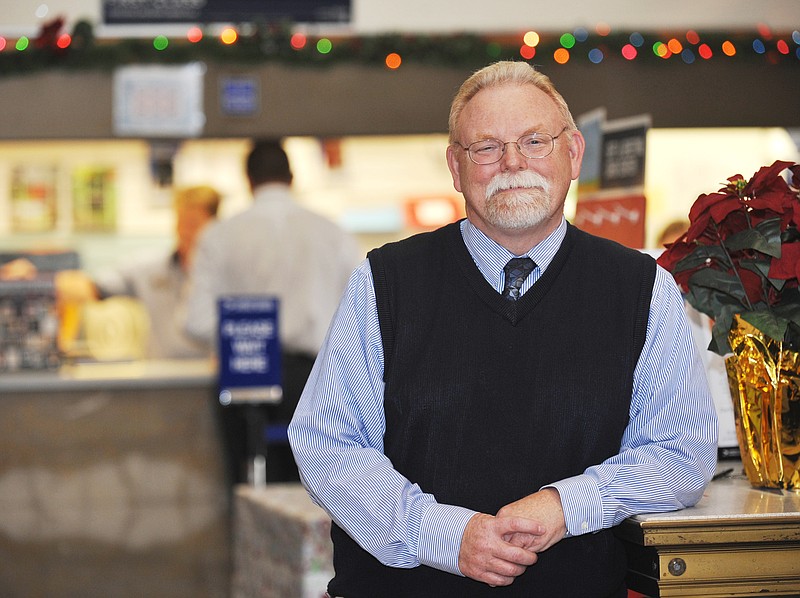Friday will be Don Knoth's last day as Jefferson City's postmaster - as well as his last day as an active U.S. Postal Service employee.
Knoth, who turns 61 in March, is retiring after 42 years with the Postal Service - including the last 13½ years as the chief administrator for the Missouri capital's mail operations.
"It's a good time for me to leave," Knoth explained in a recent interview. "After 42 years - and I realize I'm still young and in good health - I just feel that there's other things to do in life."
He didn't define those "other things," other than they probably include finding another job, part-time or full-time, for a few years.
He also wants to do some traveling, since his adult children live in Columbia, Oklahoma and Arizona.
But, even in an interview talking about his pending retirement, Knoth spent most of the time talking about the job he's leaving.
"It is the only thing that touches everybody's life, every day," he said about mail. "It still gets me going, when I talk about it!"
He was postmaster in Sikeston before being transferred to Jefferson City in June 2000 - a "good" job change since "there's only 50 other postmasters" dealing with similar issues - not only delivering and sending mail and packages for the regular businesses and residents, but also from state officials, agencies and lobbyists with government-related issues and mailings.
"In the smaller offices, the postmaster works the window, sorts the mail, puts it in the P.O. boxes (and) waits on customers. The larger you get, the more employees you have that do that," Knoth noted.
"You get to the larger offices, like Jeff City - where I have 38 city routes and 15 rural routes - I have managers and I manage my managers in their duties, and give them guidance and mentor them in getting the things (done) and reaching the goals of the Post Office."
He's not the "complaint department" that some postmasters in smaller offices have become.
Still, because they all work for a nationwide service which has adopted national rules, Knoth said he also has developed the philosophy that "the things I can control in Jeff City, I can control. Once the mail leaves Jeff City and goes elsewhere, that's out of my control."
And one of those out-of-his-control issues is the costs of running the system, which is the busiest, highest-volume mail service anywhere in the world.
The U.S. Constitution says Congress "shall have Power To ... establish Post Offices and Post Roads."
In 1970, Congress approved a reorganization plan which gave it better financing authority, removing "the system from politics to assure continuity of management," and setting its own rates.
Knoth said annual news reports that the agency "is losing billions of dollars" can cause a lot of confusion for the general public because a 2006 federal law required the mail service to pre-fund retiree health benefits for years to come - an annual payment of around $5 billion.
Still, he noted, the U.S. Postal Service's daily work largely is successful.
"Our carriers are the only people who go door-to-door, every day," Knoth explained. "There's no other company that provides that type of service.
"And we also provide the final delivery for UPS and FedEx parcels now, too."
Knoth didn't anticipate any of those headaches when he started working at an Illinois Post Office in 1971.
"My father was a carpenter, so I got into the program to be an apprentice carpenter ... once I graduated from high school (in 1971)," he recalled. "And during that summer, I decided that my father was in heavy construction, and I saw the wear-and-tear that it did on him - I thought, "Maybe I could go to college and get a degree in something and do something different.'"
While in college, a friend introduced him to the Postal Service "Postal Assistant" program that allowed people to work part time while in school and "as many hours as you wanted" during the summer.
When the USPS ended that program, and Knoth was married with one child, he said: "There was a decision to make - to either quit the Post Office or continue on as a career employee."
He decided to stay, with a personal goal of becoming a supervisor.
"I didn't dream of becoming a postmaster," Knoth recalled.
Promotions in the system generally require a move to somewhere else. For Knoth, the first move was to northern Illinois, then to Cape Girardeau, then Sikeston in 1993 and Jefferson City in 2000.
"I've been fortunate that I have a great family (and) a great wife," he observed. "I probably wouldn't be where I am today without them."

